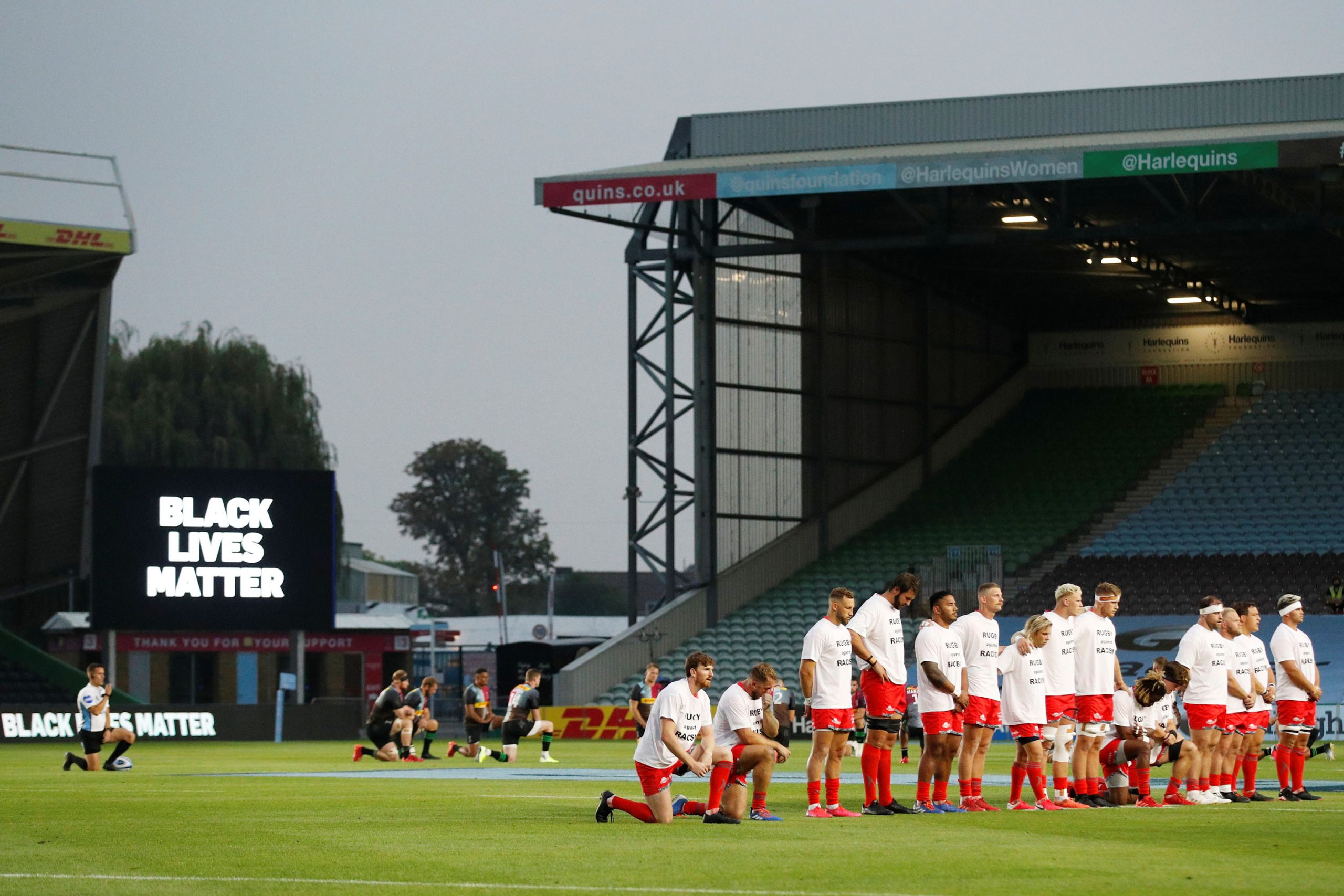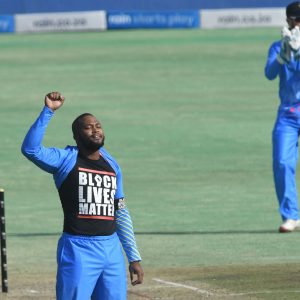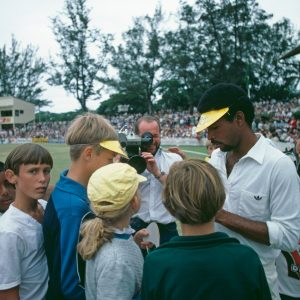SA rugby, from World Cup euphoria to refusing to take a knee
The South African rugby players who refused to take a knee in England, months after the Springboks sought to use their World Cup win to ‘pull the country together’, have exposed the facade of unity…
Author:
27 August 2020

The party seemed like it would go on forever. Three days before it officially started, Springbok captain Siya Kolisi lifted the Webb Ellis Cup in Japan as captain of the best rugby side on the planet. Now on home soil, he stood in an open-top bus, brandishing the trophy in a nationwide parade that would span four days. By the time it was over, millions of South Africans needed a nap.
“We are so grateful to see these beautiful scenes,” Kolisi told a crowd in Soweto during the jamboree. “We hope that this is going to pull the country together and fight together as one to make this country amazing again.”
He was not alone. Apart from a few curmudgeons in red overalls and a handful of right-wingers unable to accept that the Boks were skippered by a black man, the overwhelming sentiment was one of hope. Hope in the actualisation of Nelson Mandela’s assertion that sport has the power to change the world. Hope in a new dawn after so many dark horizons. Hope that a band of brothers unified by an emblem and a common goal could bring together disparate factions after decades of hurt and mistrust and neglect and resentment.
For a while, hope endured. In February, three months after their emphatic 32-12 win over England in the final, the Springboks were recognised as the Laureus World Sports Team of the Year. On receiving the award, Kolisi again espoused a message of unity. His team was a beacon for a rainbow nation no longer desaturated. His journey from poverty to prosperity had become a guiding light. A new dawn indeed
Then the world stopped spinning. The coronavirus put the brakes on almost everything on the planet but it also denied us the opportunity to galvanise around our favourite sports teams. Kolisi, Makazole Mapimpi and others have emerged as totems of athlete-activism in this trying time, but they have done so more as individuals than as part of that united force.
Related article:
Can something disappear if it never truly existed?
This convoluted question has no definite answer. It is, however, worth considering in light of 10 Britain-based South African rugby players declining to take a knee in support of the Black Lives Matter movement and how their actions chafe against the views of their national captain.
In an impassioned video on Instagram, Kolisi related his well-documented struggle in the game to the global campaign for racial equality. “I didn’t feel like I mattered. If my suffering and my pain does not affect you, then we’re not actually stronger together. Until our lives matter, no lives matter. Black lives matter.
“We have to start addressing these issues. People are standing up. I won’t keep quiet. If it will cost me my place in the team it doesn’t matter. It is time for all of us to change and start living for the South Africa that so many people have died for. It is time for all of us to come together.”
Refusing to take the knee
That message was clearly lost on two of Kolisi’s World Cup-winning teammates – Faf de Klerk and Lood de Jager – who, along with six other South Africa-born Sale Sharks players, stood while others kneeled before their match against Harlequins on 14 August. The next day in Worcester, Ruan Ackermann was the only Gloucester player standing while Francois Venter was one of three Warriors players who remained upright.
It’s been more than four years since Colin Kaepernick bent the knee ahead of a National Football League preseason game in protest against excessive police violence towards black people. The former San Francisco 49ers quarterback originally remained seated for his country’s national anthem but transitioned to one knee following the advice of retired army green beret Nate Boyer, who felt it would be respectful towards veterans.
Today, the gesture is intrinsically linked with on-field protest and has become a one-size-fits-all act of solidarity with a number of social justice causes. It is also divisive.
This is in part owing to the binary nature of the act. You either kneel or you don’t. But to transpose a black and white metric on to multifaceted and complex issues such as structural inequality, racial biases, centuries of oppression and unequal power structures will inevitably lead to disagreement. It’s a zero sum game.
Related article:
Are athletes who refuse to take a knee racist? Conversely, does every kneeling body house a mind free from prejudice? Neither conclusion neatly fits the narrative.
Seeking clarity, Minister of Sports, Arts and Culture Nathi Mthethwa called for an inquiry by mother body SA Rugby. While acknowledging that all Sale Sharks players wore a shirt declaring “Rugby Against Racism” prior to kick off, the minister was concerned with the optics of his countrymen standing in apparent defiance.
“We are ready to take whatever steps necessary to ensure that people toe the line and those who are racist are taught to embrace other people,” Mthethwa said. “If that doesn’t happen, government is going to come in handy to ensure that we do what the Constitution mandates us to do. Non-racialism is not just something that is superficial but has to come from the roots.”
SA Rugby has been measured in its response. Understandably, government intervention is a sensitive topic.
Former Harlequins player and Namibian national team captain Renaldo Bothma did not show the same restraint when he tweeted: “I will never take a knee to anyone else than GOD! Where are all these ministers when we need to take a knee for farm murders in South Africa and take action against corruption? We can all decide what we want to do! NOBODY HAS ANY RIGHT TO FORCE SOMEONE TO GO ON THEIR KNEES!”
The impact of whataboutism
Whataboutism plagues every campaign. If social media existed in 1517, there is little doubt that someone would have chastised Martin Luther for nailing only 95 thesis on that church door in Wittenberg.
Bothma is correct in saying that no one should be forced to kneel. At the same time, anyone can kneel for whatever cause they hold dear, now that kneeling has become an encompassing expression for any form of social activism. But what is important to note is that kneeling in solidarity for one cause does not mean that you stand in opposition to another.
“This thinking is born out of a misunderstanding of what Black Lives Matter is saying, it is not about championing blackness over another race,” says Andre Bartlett, a Dutch Reformed Church minister from Johannesburg and vocal supporter of various civil rights campaigns, including those for same-sex relationships.
“As for the religious angle, Jesus would have been a supporter of the Black Lives Matter movement. He is always on the margins. He was born on the margins, he lived on the margins, he reached out to marginalised people, he set himself up against the establishment, he was crucified, which was the form of execution reserved for criminals against the state. He was marginalised into death. I don’t see any tension between being a follower of Jesus and supporting Black Lives Matter.”
Related article:
According to Bartlett, the act of kneeling is not one of subservience but rather an expression of a desperate plea. As he interprets the scripture he preaches, it is a sign of one’s humility in the face of a higher power. That does not have to be a deity and can also include an important fight for social justice.
“As a Christian, I can fully identify myself with the movement,” Bartlett says. “It is not about worshipping blackness or something other than God. It is about protesting for a better world. If it was about gender-based violence or children’s rights, I would feel the same way. This is about saying black lives also matter.”
Although not an ardent sports fan, Bartlett understands better than most how an invisible force can bring people together.
“In a way, rugby is the major religion of South Africa,” he says with a laugh. “Rugby and religion both speak to people on a primal level. They go down to the essence of your being. I saw what happened after the Springboks won the World Cup. What that did is something that the Church hasn’t been able to do as well.”
Momentum lost
A vacuum has emerged during the Springboks’ hibernation. The last time we saw Kolisi and company in green and gold they were ascending to the summit of the world. We then welcomed them home as conquering heroes. A wave was cresting, there was no telling where it would take us.
Instead it has dissipated. All momentum has gone. Those rallying cries of “Stronger Together” now sound hollow as they echo off the rubble left by the coronavirus and a slew of culture wars. Without the distraction of sport, we are left to contemplate the realities of economic turmoil, unchecked corruption, increasing inequality and a host of impossible to answer questions.
Related article:
What happened to that sense of unity we felt so keenly? How do we restore what is lost? Can something disappear if it never truly existed?
Abstract or not, what was apparent for four days in early November is that sport can change the world, but it is not a panacea for our ills. Unity takes work. Equality requires commitment. Togetherness does not materialise by proxy of athletic triumph.
It is not enough to not be racist. One must consciously and conspicuously fight against this evil. In the binary decision of kneeling or not in support of Black Lives Matter, only one option is anti-racist.




